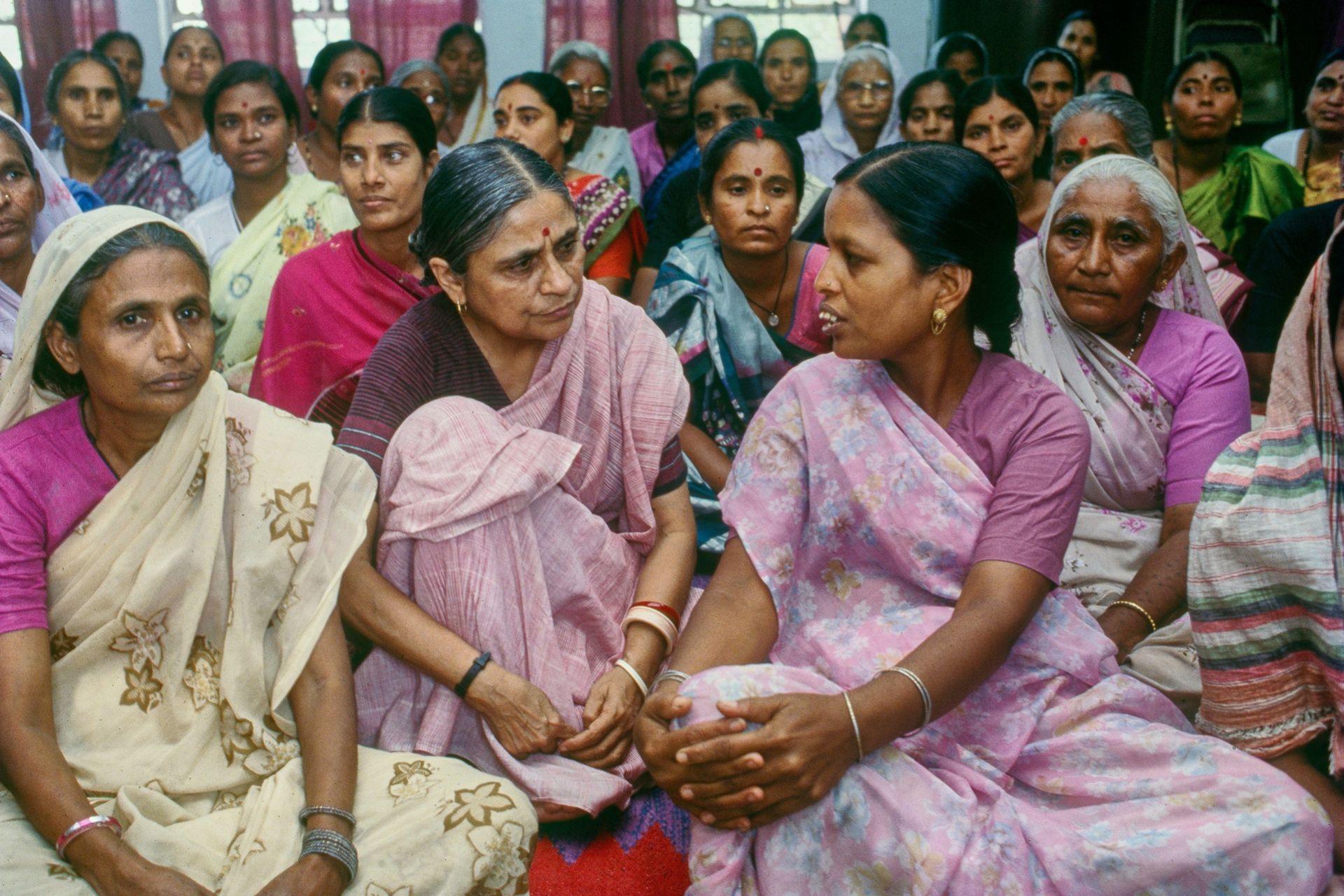尊敬的用戶您好,這是來自FT中文網的溫馨提示:如您對更多FT中文網的內容感興趣,請在蘋果應用商店或谷歌應用市場搜尋「FT中文網」,下載FT中文網的官方應用。
It was 1989, and police had come to clear a women’s sit-in. The protesters worked as vendors and Ahmedabad’s municipal corporation wanted them off the street, a move that would jeopardise their livelihoods. But the officers had not reckoned with a petite union leader who argued for two hours — until they finally gave in.
那是1989年,警察來清理一場婦女靜坐示威。抗議者是小商販,艾哈邁達巴德市政公司要求他們離開街道,此舉將危及他們的生計。但官員們沒想到,一個身材嬌小的工會領袖竟然爭論了兩個小時——直到他們最終讓步。
The policemen had come up against India’s “gentle revolutionary”. An activist who championed collective power, Ela Ramesh Bhatt, affectionately called Elaben (ben means sister), died earlier this month. Pioneering financial services for poor women, Bhatt fought tirelessly against poverty, and became a global feminist icon with admirers from Nelson Mandela to Hillary Clinton.
警察們遇到了印度的「溫柔革命者」。倡導集體權力的社運人士埃拉•拉梅什•巴特(Ela Ramesh Bhatt),被親切地稱爲埃拉本(Elaben,ben意爲姐姐),於本月早些時候去世。巴特開創了爲貧困婦女提供金融服務的先驅者,不知疲倦地與貧困作鬥爭,併成爲全球女權主義的偶像,納爾遜•曼德拉(Nelson Mandela)和希拉里•柯林頓(Hillary Clinton)也是其崇拜者。
Born to a well-off family in Gujarat in 1933, Bhatt’s early life was steeped in India’s freedom struggle against British colonialism. She attended school and college in Surat, before studying law in regional capital Ahmedabad, dubbed the “Manchester of India” for its textile mills. She later married fellow student leader Ramesh Bhatt.
巴特1933年出生於古吉拉特邦的一個富裕家庭,他的早年生活沉浸在印度反對英國殖民主義的自由鬥爭中。她在蘇拉特上了中學和大學,之後在地區首府艾哈邁達巴德學習法律。艾哈邁達巴德因其紡織廠而被稱爲「印度的曼徹斯特」。後來,她嫁給了學生領袖拉梅什•巴特(Ramesh Bhatt)。
Bhatt joined the Textile Labour Association’s legal team soon after university and began battling for unionised workers’ rights. At that time, “we were rebuilding the nation, looking to a more just society,” the lawyer recalled in 2010.
大學畢業後不久,巴特就加入了紡織勞工協會的法律團隊,開始爲工會工人的權利而奮鬥。那時候,「我們正在重建國家,希望建立一個更加公正的社會,」這名律師在2010年回憶道。
In fighting for the union, Bhatt realised most workers were not unionised, and had neither protection from exploitation nor regular salaries. This so-called informal sector, which most female workers belonged to, spanned home-based craftspeople, street vendors and small-scale farmers.
在爭取工會的過程中,巴特意識到大多數工人沒有加入工會,既沒有免受剝削的保護,也沒有固定的工資。這個所謂的非正規部門,大多數女性工人都屬於這個部門,包括以家庭爲基礎的手工業者、街頭小販和小農。
Determined to change this, Bhatt started the Self-Employed Women’s Association (SEWA) in 1972, India’s first working women’s movement. “As individual workers they were invisible, isolated, and totally powerless,” she said in 2017. “By creating the union they laid claim to their status as workers for the first time”.
爲了改變這種狀況,巴特在1972年成立了自由職業者婦女協會(SEWA),這是印度第一個職業婦女運動。「作爲個體工人,他們是隱形的、孤立的、完全無權的,」她在2017年說。「透過建立工會,他們第一次宣稱自己是工人」。
The first 6,000 members took a decade to recruit. Today SEWA is India’s biggest union — it counts 2.1mn members and provides services from healthcare to training. Bhatt was general secretary for over two decades. SEWA members flocked to Ahmedabad in their thousands for her funeral.
第一批6000名成員的招募花了10年時間。今天,SEWA是印度最大的工會,擁有210萬會員,提供從醫療到培訓的各種服務。巴特擔任祕書長超過20年。數千名SEWA成員湧入艾哈邁達巴德參加她的葬禮。
But what Bhatt described as “changing the balance of power in favour of the poor” was not accepted by the rich and powerful, and SEWA met with “constant tension, with big farmers, moneylenders, contractors, big traders, government”. Bhatt also clashed with the male-dominated unions, confronting their refusal to recognise informal workers.
但巴特所描述的「改變權力平衡,使之有利於窮人」並沒有被有錢有勢的人所接受,SEWA遇到了「與大農場主、放貸人、承包商、大商人、政府之間持續的緊張關係」。巴特還與男性主導的工會發生了衝突,反對他們拒絕承認非正式工人。
Bhatt knew finance was critical to eradicating poverty. Loan sharks preyed on self-employed workers, without bank accounts or health insurance, whenever they suffered mishaps from crop-ruining storms to injuries. So in 1974, SEWA started a women’s bank.
巴特知道金融對消除貧困至關重要。高利貸者在沒有銀行賬戶或醫療保險的個體戶身上搜刮,尤其當他們遭遇從破壞莊稼的風暴到受傷的災難。1974年,SEWA成立了一家婦女銀行。
“Poor women are economically active,” the micro-financing pioneer argued, and “should not be considered unbankable”. Bhatt insisted on putting money in their hands rather than their husbands’. Women were more prudent and productive with money, she contended; SEWA’s loan recovery rates supported her thesis, at well over 90 per cent. She became a founding member of global microfinancing network Women’s World Banking in 1979.
「貧困婦女在經濟上是活躍的,」這位小額融資的先驅認爲,「不應被認爲是無法獲得銀行貸款的」。巴特堅持把錢交到她們手裏,而不是她們的丈夫手裏。她認爲,女性在花錢方面更謹慎、更有效率;SEWA的貸款回收率遠遠超過90%,支援了她的論點。1979年,她成爲全球小額融資網路婦女世界銀行的創辦成員。
In the mid-1980s, Bhatt had a brief parliamentary foray when she chaired a national commission on self-employed women, forcing the cause into the spotlight. Poverty “is man-made”, said Bhatt years later, “and therefore always a political question.”
20世紀80年代中期,巴特曾短暫進入議會,當時她主持了一個全國自主創業婦女委員會,迫使這項事業進入聚光燈下。多年後,巴特說,貧窮「是人爲的,因此永遠是一個政治問題。」
But politics was troublesome. In 2005, Gujarat’s state government, led by now prime minister Narendra Modi, alleged financial irregularities in state-funded SEWA work. SEWA denied the allegations, accusing the administration of “harass[ing] and discredit[ing] SEWA”.
但是政治是麻煩的。2005年,由現任總理納倫德拉•莫迪(Narendra Modi)領導的古吉拉特邦政府聲稱,在國家資助的SEWA項目中存在財務違規行爲。SEWA否認了這些指控,指責政府「騷擾和抹黑SEWA」。
Bhatt’s friend Shiv Visvanathan, an academic, remembers her as a formidable intellectual, with deep misgivings about Modi’s government: “she had an ethics,” he said, defining it as “a goodness that can sense evil”.
巴特的朋友希夫•維斯瓦納坦(Shiv Visvanathan)是一名學者,在他的記憶中,巴特是一名令人敬畏的知識分子,對莫迪政府懷有深深的疑慮:「她有一種道德觀,」他說,並將其定義爲「一種能感知邪惡的善良」。
Bhatt — who served as chancellor of a university founded by Gandhi — embodied Gandhian simplicity, with her severe middle parting and khadi cotton saris, and her modest bungalow where she used her bed as a desk chair. Yet Bhatt was far from austere: she cultivated a love for Indian classical music and could often be found gossiping on the swing bench in her living room.
巴特曾擔任甘地創辦的一所大學的校長,她有著甘地式的簡樸風格,嚴謹的中分和卡迪棉紗麗,她的平房樸實無華,她把牀當桌椅用。然而,巴特一點也不嚴肅:她培養了對印度古典音樂的熱愛,經常可以在起居室的鞦韆凳上看到她在閒聊。
A SEWA member now “knows that she is important”, Bhatt said in 2010. “She has a name, an address, a bank account number, an insurance policy, a pension plan . . . She is more aware that poverty is not destiny . . . what the women have gained is self-esteem”. Chloe Cornish
巴特在2010年說,一位婦女婦女協會的成員現在「知道自己很重要。她有姓名、地址、銀行賬號、保險單、退休金計劃……她更加意識到貧窮不是命運。女性獲得的是自尊」。

